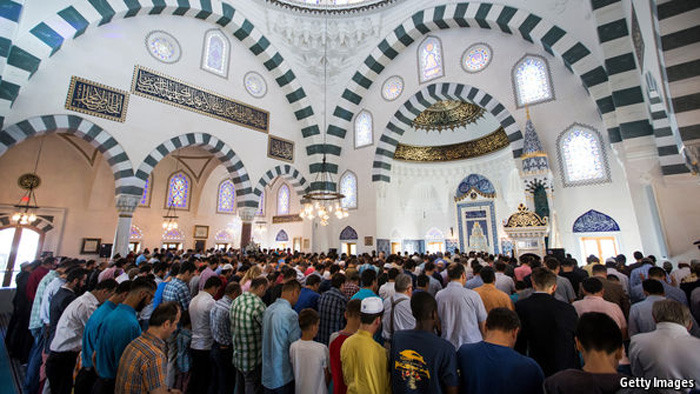Friday sermons have been a weekly mainstay of your correspondent’s life since boyhood. But none has ever felt as worthwhile as this one, delivered to the assembled congregants, some 80 Muslims who had gathered in this college town in the middle of Trump country on November 18th. Even the little ones, who usually harangue one another and jostle and fidget throughout the whole service, sit somberly.
The bespectacled imam, a mild-mannered family friend, speaks with uncharacteristic steel. He’s a man more given to scholarship than sanctimony, a doctor who has memorised the entire Koran and quotes the poetry of Muhammad Iqbal at great length. But today, his words are hard and unflinching. “Hate has now gone mainstream,” he proclaims, unexpectedly political. He notes that Michael Flynn, the man Donald Trump has chosen to be his national security adviser just that day, has publicly called Islam “a cancer”. He warns of troubled times ahead.
Since Mr Trump’s surprising election victory two weeks ago, the apprehension among America’s Muslims, who number some 3.3m, has never been higher. And not without reason. Kris Kobach, a member of Mr Trump’s transition team, has recently suggested a national registry for immigrants and visitors from Muslim countries. In defending those remarks on Fox News, another surrogate noted the precedent of Japanese internment.
The clamour is hard to ignore, given that much of Mr Trump’s candidacy was staked on fear-mongering about Islam. In December last year, he called for a “total and complete shutdown of Muslims entering the United States”. After the mass shooting at an Orlando night club in June, Mr Trump suggested that America’s Muslims knew who the terrorists were, but were reluctant to turn them in. He also hinted then that Barack Obama secretly approved of terror attacks, warning conspiratorially that “there is something going on”.
“What I am most worried about is our youth”, the imam says. With the exception of one Palestinian clan that planted its roots three generations ago, nearly all the Muslim families in Lexington are still headed by first-generation immigrants, hailing from Pakistan or Egypt or elsewhere. Their children speak accentless English—one or two even allow a Southern twang to creep in—dawdle in the local Fayette Mall, and swathe themselves entirely in wildcat blue on days when the University of Kentucky’s basketball squad plays. They are, in short, utterly, almost boringly, American. They fear an asterisk will soon be appended to that.
No one will be scrambling for visas, however. Crusades, colonialism and the collapse of the caliphate did not spell the end for Islam, and neither will Mr Trump, the imam says with resolve. He relates the story of two neighbouring suras in the Koran, revealed around the time of another calamity many ages ago—when divine revelations had ceased to come to the prophet for a period of time, provoking great despair and anxiety. In the first, God consoles him: “Your lord has not taken leave of you, nor has he detested you.” In the second, God advises, in one of the scripture’s most quoted verses, “indeed, with every difficulty there comes relief”.
After a short prayer, the jummah service is over. The congregation sits and silently offers their private supplications. A sniffle and a cough is heard. The imam urges everyone also pray that his cold go away, as it has lasted four weeks and is “very annoying”. The assembly laughs and life goes on.







Comments